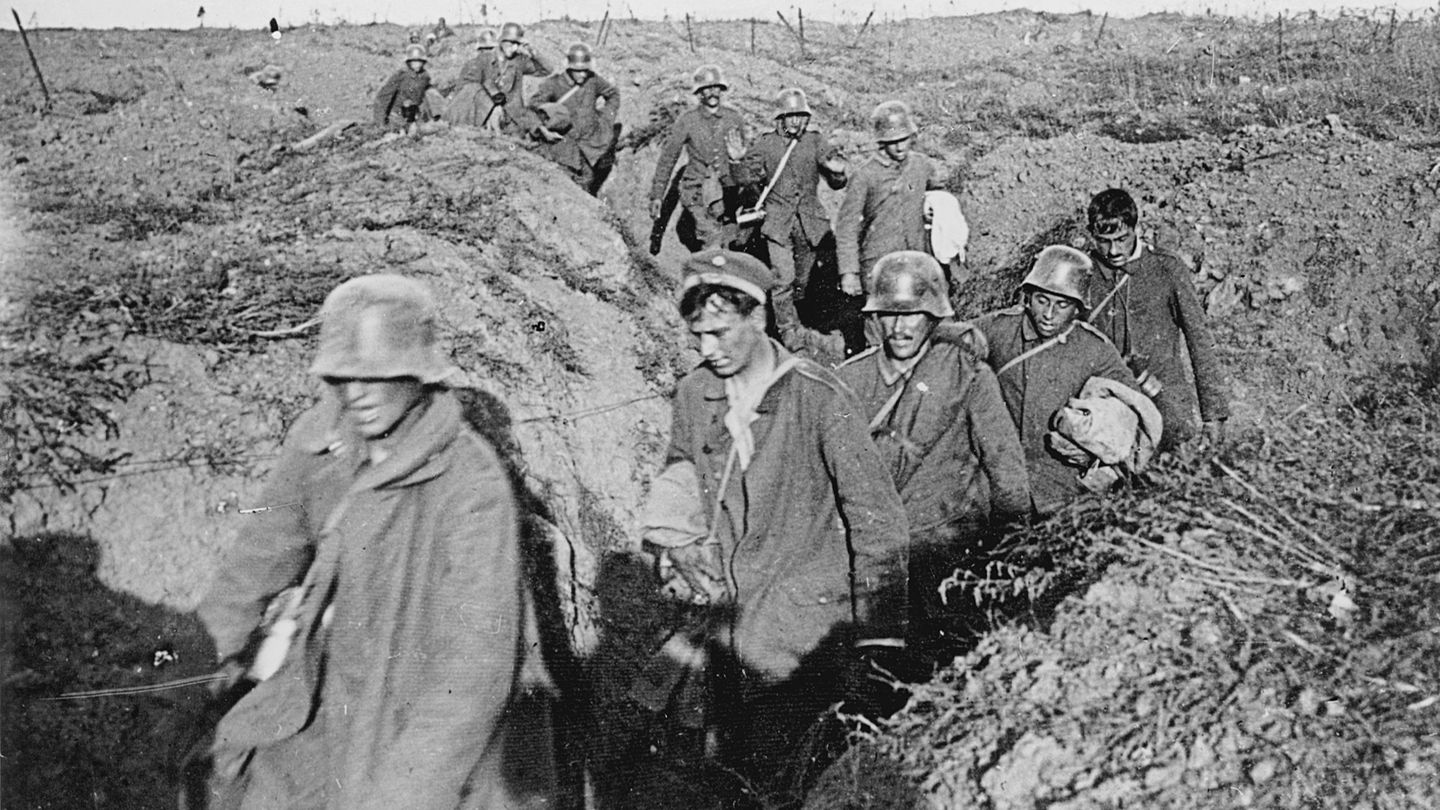With cheers and waving hats, the soldiers marched into this war in 1914. Four years later the world was different: Wilhelm II abdicated and his empire fell. The Weimar Republic never recovered from the mortgage at the end of the war
The First World War is still called “The Great War” in Britain, not the more devastating Second World War. It is considered to be the “primordial catastrophe” of the 20th century. Because the new century was overshadowed by the consequences of this war. From its ruins rose two people who later shook civilization to the very foundations: Hitler and Stalin.
Cheer up the disaster
In 1914, when the war began, no one suspected of these consequences. Little did they know that the First World War would destroy the world of the ruling houses of the 19th century and the supremacy of the nobility. One thought of a campaign with glorious battles, which of course would involve losses, but would require limited sacrifices in the foreseeable future. The soldiers went to war waving their hats. The Germans with absurd spiked bonnets in an imperial retro look, the French in brightly colored uniforms in the national colors.
The killing industry
Then the war brought industrial-scale slaughter to Europe. He brought trench warfare and gas warfare. The cutting edge of classic assault attacks was destroyed in the fire of machine guns. In every participating country he left a “lost generation”. A generation of lost people from whom Adolf Hitler’s comrades-in-arms were recruited in Germany.
British war premier David Lloyd George later openly admits how clueless the political class was. “The nations slipped over the edge into the seething cauldron of war without a trace of concern or dismay,” according to his memoir. The war premier sees the guilt for the war in politics: “In July 1914 the world was extraordinarily hapless with regard to the quality of its statesmen in this terrible emergency.”
A lost generation remained
This war traumatized an entire continent. Since the regiments then recruited their soldiers in one region, there were areas in Great Britain where several years of male students disappeared in the hell furnace of the summer battles. Until the 1960s, one encounters the deep sadness of the few survivors in literature and memoirs.
The First World War was triggered by the assassination of the Austrian Archduke Franz Ferdinand in 1914 and ended four years later. Shortly before that, Germany and its allies, the so-called Central Powers, triumphed again. In 1917 revolutionary Russia signed an armistice. That was the end of the two-front war. The Central Powers could concentrate on the West. The ceasefire in the east should enable them to withdraw large numbers of troops there and throw them on the western front. It seemed as if the Central Powers might still win the war.
Failure of the last offensive
But they only had a small window of time. US President Woodrow Wilson had officially declared war on Germany. The German army command wanted and had to bring about a decision quickly before the rested USA could bring large contingents of troops to Europe.
One last quick offensive should force the decision. In the spring of 1918, the Germans launched a series of offensive operations against the French and British troops. Operation Michael was the largest of these offensives. It drove the Allies back through the rubble fields of the Summer Battle of 1916, until shortly before Paris. Where the Germans were already in 1914.
The soldiers couldn’t and didn’t want to
But then the German forces were exhausted. Despite their success, they did not succeed in punching the “hole” in the opposing front that the German Supreme Army Command had dreamed of. The troops were exhausted – the soldiers could and for the most part no longer wanted to. Whole troops sat out orders. Units willing to fight were insulted by the mass of soldiers as strikebreakers and prolongers of the war. The French and British troops held out, waiting for the US to reinforce them. On August 8, 1918, their Hundred-Day Offensive began – a series of decisive counter-attacks that drove the Germans back. In the autumn of 1918 Germany and its allies were exhausted. The armies were bled and defeated. At home the hungry citizens began to rebel.
Nevertheless, the German Navy wanted to set sail on October 24th to fight the British. That was a completely hopeless action. A pure gesture, according to the motto: “Go down with waving flags”. So the Admiralty wanted to keep the “honor”. But the sailors did not want to die certain death for this honor. They started a mutiny. The unrest began in Kiel, and on November 7th, many of the major ports rebelled against the German government. The troops at the front no longer obeyed, entire units let themselves be captured and now the home slipped away from the leadership. The revolution that the German leadership had promoted with the intention of weakening Russia had arrived in Germany. The allies saw the hopelessness. Austria-Hungary signed the armistice on November 3rd. Turkey had done the same on October 30th, Bulgaria had given up on September 30th.
Eventually, Berlin turned to the United States with an armistice motion, signed on November 11, 1918, to end the war. On June 28, 1919, Great Britain, the United States, France, Italy and Japan signed the Treaty of Versailles with Germany. The treaty forced enormous financial, territorial, and political concessions from Germany, including renouncing the emperor and making enormous reparations payments. It also contained a provision requiring “Germany to accept responsibility for Germany and its allies for all losses and damage caused” during the war. In addition, Germany was only allowed a small army without modern armament.
Generals sneaked out of responsibility
In Germany the generals achieved a propaganda feat. She alone was responsible for the way the war was fought and lost. She was not responsible for this, it was passed on to the politicians who wanted to prevent the worst after the collapse. From this arose the “stab in the back legend”, according to which the troops in the “field should have been undefeated”, only the revolt of communists and anarchists is said to have deprived them of victory. Nothing was more wrong than this thesis and yet it poisoned life in the short-lived Weimar Republic.
David William is a talented author who has made a name for himself in the world of writing. He is a professional author who writes on a wide range of topics, from general interest to opinion news. David is currently working as a writer at 24 hours worlds where he brings his unique perspective and in-depth research to his articles, making them both informative and engaging.




